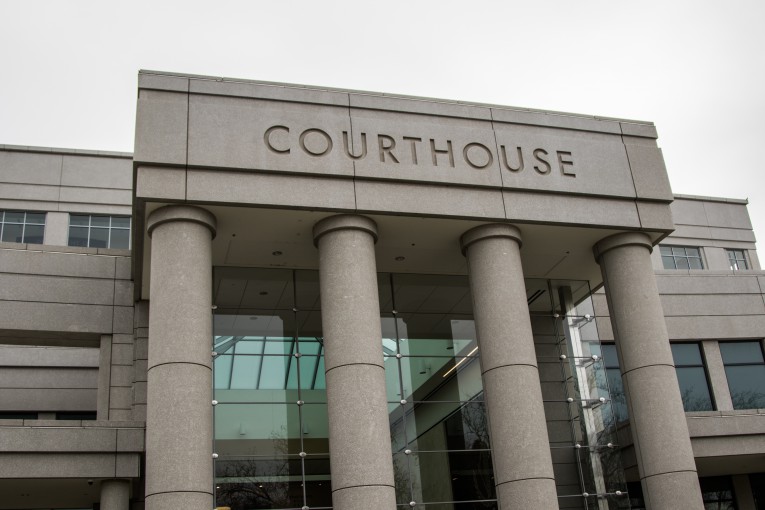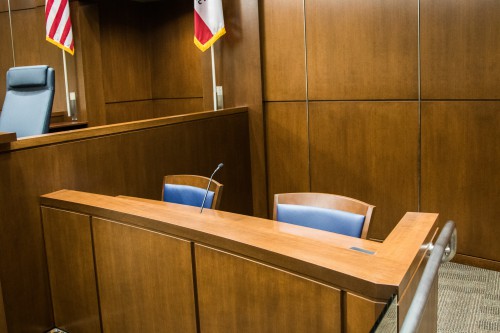
 By Tiffany Yeh
By Tiffany Yeh
The preliminary hearing for Mary Elizabeth Amuzie started Tuesday afternoon. She is charged with felony offering to sell methamphetamine.
One issue about the undercover drug sting by YONET (Yolo Narcotic Enforcement Team) was whether the officer who arrested Ms. Amuzie had probable cause to do so; was the probable cause found after Ms. Amuzie was arrested, relying heavily on conversations the undercover officer had with the arresting officer after the undercover drug sting?
Should the undercover officer have to reveal his/her name and identity so the credibility of the undercover can be assessed and so defense can question them in person?
Defendant Amuzie is being represented by Deputy Public Defender Daniel Hutchinson and the prosecution is represented by Deputy District Attorney Jennifer McHugh.
The first witness, Officer Kurt Diesslin, is a deputy in the Probation Department at West Sacramento and currently is a special investigator with YONET. He has been part of the arrest team with YONET for six months. He had previously been a Yolo County Probation Officer for eight years.
On March 30, 2016, around 4pm, YONET undercover operations did a drug sting along West Capitol Avenue in West Sacramento. When asked why West Capitol was chosen for this drug sting, Officer Diesslin stated there is a high volume of drugs and drugs sales there. The undercover officer, in plain clothes, walked down West Capitol and asked an individual for drugs. The individual said that they did not have any drugs, but could get him drugs. This individual asked another person if they had drugs.
It was after the undercover talked to the first two people, and talked to the last individual (Ms. Amuzie), that arrests were made of the three people total.
The striking part of this preliminary hearing was when the Officer Diesslin stated that the undercover officer told him (referring to Diesslin) that the defendant, Ms. Amuzie, stated that “I can get you better s–t than that.” (The “I” is referring to Ms. Amuzie).
This quote’s word “s–t” refers to drugs.
When DPD Hutchinson was questioning Officer Diesslin, the officer replied that Ms. Amuzie said that she could get the undercover officer better drugs. When questioned further, Officer Diesslin stated that the undercover officer had told him after the arrest about that part.
DPD Hutchinson objected to that part, because the officer had gotten that information from the undercover (hearsay), and the judge ordered that part to be stricken.
The problem throughout the preliminary hearing so far was that Officer Diesslin could not remember the specific words Ms. Amuzie had said during the interaction between her and the undercover officer.
Officer Diesslin was monitoring the audio portion of the sting—he could hear it broadcast over a speaker. A recording device/microphone/wire was on the undercover and so he could listen in. Other officers were monitoring the two other individuals. Officer Diesslin described the quality of the live audio at the time as not that great because of background noises.
The undercover was wearing a video camera but Officer Diesslin was not aware if there was a livestream from that. Officer Diesslin did not physically see the interactions between the undercover and the defendants (including Amuzie) until later, near the time he went to arrest Ms. Amuzie. He could tell that the first two defendants’ voices were of males and the voice later was of a female.
Officer Diesslin had not reviewed the audio recording of that day before coming into court for this hearing. He remembered hearing a female voice and that drugs were involved.
Through parts of the preliminary hearing, Officer Diesslin referred to his own police report to refresh his memory. According to the officer, Ms. Amuzie approached the undercover and made the undercover an offer to buy drugs. This seems to have been told to him by the undercover, in conversations after Amuzie was arrested.
Ms. Amuzie asked or stated (Diesslin was not sure, from memory, whether it was stated or was a question), “You’re a cop,” to the undercover officer. She also asked some variation of, “Where are you from? What are you doing here?”
Amuzie and the undercover officer then walked (eastbound on West Capitol), in the direction where Amuzie would buy meth, for the undercover, in exchange for $20. She did not tell the undercover where her source of drugs would be.
However, at some point, the undercover communicated to Diesslin to come over and arrest Amuzie. Officer Diesslin did arrest Ms. Amuzie.
At the same time that Amuzie was being arrested, officers were arresting the other two suspects (Berry and Robinson). This preliminary hearing was for Ms. Amuzie’s case only; the other defendants probably have other cases.
When asked about what the probable cause was for Officer Diesslin to arrest Ms. Amuzie, Diesslin stated that it was from the audio device and the conversations with the undercover afterward, when Ms. Amuzie spoke about getting drugs. The officer has known the undercover for six months.
Pointed out by DPD Hutchinson, a transaction occurred between the undercover and the two suspects, but not with the undercover and Ms. Amuzie. The undercover and Amuzie had been walking somewhere.
DDA McHugh had Officer Diesslin as her sole witness during the preliminary hearing. DPD Hutchinson made it clear that it was hard to do his job when he could not question an unknown individual (referring to the undercover) and when the only witness (referring to Diesslin) did not remember any specific parts of the undercover’s conversation with Ms. Amuzie.
Mr. Hutchinson wanted to delve into the credibility of the undercover (related to Evidence Code section 1040, et seq.) and that, under 1042, the officer’s (apparently referring to Diesslin) testimony could be stricken. He cited Hines v. Superior Court, 203 Cal. App. 3d 1231. During a drug buy, an officer had binoculars and was watching. They invoked an official-information privilege of section 1040, subdivision (b), but because it was material fact, the officer’s testimony should have been stricken. The invoking of the privilege deprived the petitioner in that case of his fundamental right to cross-examination on a material issue. If it is material, then the finding should been against the government. Hutchinson seeks a section 1042 remedy.
DDA McHugh had invoked the official-information privilege at least two times during this preliminary hearing, regarding keeping the identity of the undercover private. She expressed her concern for exposing the identity of the undercover for purposes of the preliminary hearing. She suggested a EC section 915(b) in camera review (by the judge in chambers) of the information before releasing it.
The judge will review the materials, the attorneys will meet and confer, and the case will resume at 1:30pm on Wednesday, April 20.